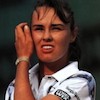Amelie Mauresmo
The story of perseverance...

|
How did Amelie get here? Let's quickly go through her biography and see what we can learn from her story…
Amelie Mauresmo started her tennis at the age of 4, supposedly because Yannick Noah won the French Open title that year. Her talents and quality training quickly launched her to the top of juniors ranking, where she won junior French Open and Wimbledon in 1996 and was named Junior World Champion by the ITF. That year she also received her first wild card entry into the main draw of the »real« tournament.
She won her first tour title in 1995 and her second in 1997. In 1998 she first entered top 100 and had a fantastic season where she won against top players. She even beat 2 of top 3 players in the world in one tournament.
What can you learn?
Amelie Mauresmo started her way of a champion early. She was already successful in juniors and that helped her enormously to believe in herself in the »real« tour where it's a gladiator game. Her early results also show that she was not intimidated by big names and that was already capable of winning against top women players.

|
Stop for second and consider how many tens of thousands of players are playing and practicing these days, and how many of them are actual contenders for a Grand Slam title.
She finished the year in the top 10 for the first time. The years of 2000, 2001, 2002 and 2003 were great for her. She won many tough matches, lost some important ones and was gaining experience in the top of the WTA tour.
There is of course a big difference between playing a top 100-150 player and winning a match against them and playing against a top 10-20 player and winning matches against them. All of them regardless of ranking can play excellent forehands, backhands and serve well. But it's the mental part that usually makes the difference.
What can you learn?
When you go for the top, you also need to get over the low and the middle part. And it takes a couple of years to learn from mistakes and to reinforce the good points to be finally able to get to a new level in your play.
It is very important that in these years where you still make many mental and tactical errors you don't make and long term conclusions and form any negative beliefs. If for example you lose in the finals of the tournament because of nerves, you need to be aware that this is a learning experience and that next time you'll be more relaxed in the finals.
You can jump quickly to the Roger Federer page and check his results in the year 2000, just 3 years before he won Wimbledon. You'll see what I mean…
In the year of 2004 Amelie Mauresmo won 5 career titles and reached Nr. 1 ranking for the first time in her career. Although she kept that ranking for only five weeks she stayed in the top 5 ranking since then.
Amelie lost a couple of big matches where she clearly displayed signs of nerves. One of the biggest problems for her is still playing in her home country when she plays Roland Garros. There is enormous pressure on her from the media and her countrymen and so far she hasn't been able to get rid of that pressure. Amelie was even considered (before this year) the best player on WTA tour to have never won a Grand Slam title.
But Amelie Mauresmo kept fighting and learning from her mistakes and finally won her first Grand Slam title at the Australian Open against Justine Henin Hardenne. It was somewhat controversial match since Henin (and Clijsters in the SF) retired because of stomach problems.
Eventually that's not really what counts for Amelie. She was the fittest; she got to the finals and won her first big title. She continued her good form and won the next two events extending her match winning streak to 16 consecutive wins.
Amelie Mauresmo entered the Wimbledon championships as nr. 1 seed and proved that position by getting to the finals where she again won against Justine Henin Hardenne. This time it was a great match where both players demonstrated top women's tennis of the modern era.
Amelie won 6:4 in the third set where she conquered all the past demons which haunted her for so long. She never felt victim to nerves, she went for her shots, was focused on what she wanted and eventually won the match against one the best players in the world – Justine Henin Hardenne.
What can you learn?
Amelie did have problems with her nerves but that doesn't mean that she will have them forever. She finally accepted that she has nerves and that she is not perfect in that department.
What this did for her is she got rid of guilt and shame whenever she felt the pressure and nerves affecting her game. It's one thing to be affected by the nerves but it's totally devastating to your game and self respect to feel guilty about it.

|
Because now when she feels the pressure she says ok, that's how I am, let's move forward and win the match anyway. And the result? She is affected by pressure only for a short time and then she can find the zone state again.
She is focused again on her goal and gives her best to reach it.
There is a lesson hidden in Amelie Mauresmo's story. Apply it to your tennis game, yourself and the »life game« and things will change for the better. Remember, whatever you resist, will continue to persist.
You may also like -








